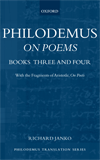People

Richard Janko Gerald F. Else Collegiate Professor of Classical Studies rjanko@umich.edu | homepage
In my studious youth I equally studiously avoided ancient philosophy, though I was unknowingly more deeply influenced by the Lucretius I read at school than my Latin teacher might have wished. Obliged as a graduate student to read Aristotle’s Nicomachean Ethics, I radically changed my mind: here at last was a philosophy that seemed actually useful for life. Compelled in my first academic post to teach Aristotle’s Poetics, I fell in love with the difficulties of the text and the penetration of Aristotle’s thought. I went on to reconstruct his lost second book on comedy and to translate the whole work. When I learned of a rebuttal of Aristotle by Philodemus, I went to Naples and learned to read Herculaneum papyri. Once there, I found a paradise of unedited texts and fascinating ideas, both Epicurean and non-Epicurean, waiting to be brought back into the light of day.
Such technical progress has been made! So much remains to be done! Three damaged lines on Democritus made me reinterpret his whole theory of perception, to allow for his beliefs in telepathy and poetic inspiration. The left edge of a column of Empedocles’ verse made me see that he was discussing not the fate of the soul in Hades, but the creation of animals and birds. Ancient philosophy is by far the most promising branch of literary papyrology (not to mention the promise of new texts from palimpsests read with that new digital imaging).
Is there a method here, apart from an innovative use of shiny new technology to read old texts? Well, faulty texts make for erroneous interpretations. If we recover more of what was said and thought in the past, we will understand it better, and it will better help us understand our own world: let the Herculaneum papyrus that tells us more clearly what Aristotle meant by catharsis be my witness (it has implications for the present effect of violent video games).
I just brought out an edition of Philodemus’ On Poems Books 3–4. At the moment I am reconstructing Book 2, which is the most completely preserved roll I have ever seen (it had 233 columns of text). I am also writing a book on religious belief and freedom of thought in classical Athens. How was it that, in c. 435–390 BCE, political conditions and the reaction against the sophists made being a philosopher a really dangerous pursuit?
Select Publications
Articles
- “Reconstructing (again) the Opening of the Derveni Papyrus.” Zeitschrift für Papyrologie und Epigraphik 166 (2008): 37–51.
- “New Fragments of Epicurus, Metrodorus, Demetrius Laco, Philodemus, the Carmen De Bello Actiaco and Other Texts in Oxonian Disegni of 1788–1792.” Cronache Ercolanesi 38 (2008): 5–95 (large format).
- “Socrates the Freethinker.” In S. Ahbel-Rappe and R. Kamtekar (eds.), The Blackwell Companion to Socrates, 48–62. Oxford 2006.
- “Empedocles, On Nature i 233–364: a New Reconstruction of P. Strasb. gr. Inv. 1665–6.” Zeitschrift für Papyrologie und Epigraphik 150 (2005): 1–25 with 4 plates.
- “The Herculaneum Library: Some Recent Developments.” Estudios Clásicos 44 (2002): 25–41.
- “The Derveni Papyrus: an Interim Text.” Zeitschrift für Papyrologie und Epigraphik 141 (2002): 1–62.
- “The Derveni Papyrus (Diagoras of Melos, Apopyrgizontes Logoi?): a New Translation.” Classical Philology 96 (2001): 1–32.
- (with D.L. Blank). “Two New Manuscript Sources for the Texts of the Herculaneum Papyri.” Cronache Ercolanesi 28 (1998): 173–84 (large format).
- “The Physicist as Hierophant: Aristophanes, Socrates and the Authorship of the Derveni Papyrus.” Zeitschrift für Papyrologie und Epigraphik 118 (1997): 61–94.
- “Crates of Mallos, Dionysius Thrax and the Tradition of Stoic Grammatical Theory.” In L. Ayres (ed.), The Passionate Intellect: Essays on the Transformation of Classical Traditions Presented to Prof. I.G. Kidd, 213–33. New Brunswick and London 1995.
- “From Catharsis to the Aristotelian Mean.” In A.O. Rorty (ed.), Essays in Aristotle’s Poetics, 341–58. Princeton 1992.
Download a complete list of Richard Janko’s publications on ancient philosophy.
 Philodemus On Poems Books 3–4
Philodemus On Poems Books 3–4 Philodemus On Poems Books 1
Philodemus On Poems Books 1 Aristotle on Comedy, 2nd ed.
Aristotle on Comedy, 2nd ed. Aristotle’s Poetics
Aristotle’s Poetics
Follow the Program
in Ancient Philosophy